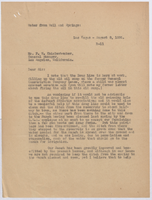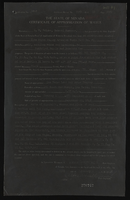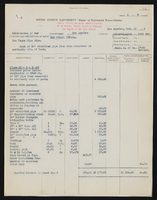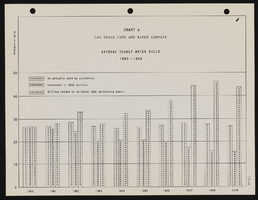Search the Special Collections and Archives Portal
Search Results

Letter from Walter R. Bracken (Las Vegas) to F. H. Knickerbocker (Los Angeles), regarding water from well and springs, August 8, 1934.
Date
1934-08-08
Archival Collection
Description
Walter Bracken asking for permission to fill in the swimming pool and use the company drag line to clean out the ditch to the Las Vegas Ranch so overflow could be used by the lesee rather than go to waste.
Text

Letter from Walter R. Bracken (Las Vegas) to R. L. Adamson (Los Angeles), March 11, 1935
Date
1935-03-11
Archival Collection
Description
Bracken calling on the Assistant Chief Engineer to do something about the leaking
Text

Letter from Walter R. Bracken (Las Vegas) to F. R. McNamee (Los Angeles), August 14, 1913
Date
1913-08-14
Archival Collection
Description
Bracken wrote to the company lawyer to find a permanent solution to a yearly problem of gate vandalism at the Stewart burial plot.
Text

Telegram from Edward C. Renwick (Los Angeles) to G. A. Cunningham (Salt Lake City), April 30, 1959
Date
1959-04-30
Archival Collection
Description
The Water District advised that they did not have the facilities to supply enough water to Las Vegas and would not object to the Union Pacific Railroad providing water from its shop well.
Text
Pagination
Refine my results
Content Type
Creator or Contributor
Subject
Archival Collection
Digital Project
Resource Type
Year
Material Type
Place
Language
Records Classification






